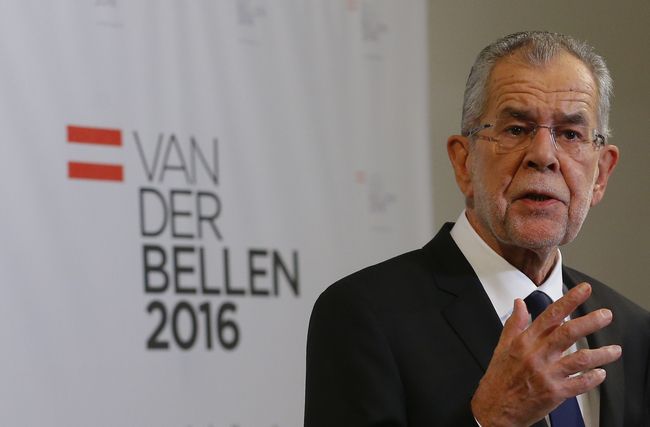“A voice for Europe”
“A voice for Europe”
The Austrian presidential election, held on December 4, resulted in a victory for the former leader of the Greens, independent candidate Alexander Van der Bellen. His opponent, the candidate of the Austrian Freedom Party and right-wing populist Norbert Hofer, has admitted defeat and congratulated the 72-year-old Van der Bellen. According to the preliminary ballot count that does not include postal votes, Van der Bellen got 51.68 percent of the vote to Hofer’s 48.32 percent.
By the way of a reminder, Van der Bellen gives Austria as his home, but stresses that he grew up in the country as a child of immigrants. His father was Russian and his mother Estonian who fled from the Soviet Union to Germany, and then moved to Austria.
On winning the contest, Van der Bellen said that he would like to have people recognizing him “on the street or on the village green or in Vienna’s underground six years from now at the end of my term, and they will say, ‘look, there is our federal president,’ everyone’s president.”
It is no exaggeration to say that Europe sighed with relief after learning of Van der Bellen’s victory. After all, had Hofer won, he would have become the very first far-right populist president of a Western nation.
European Council President Donald Tusk congratulated the 72-year-old politician and stressed the importance of the election result. “At a time when we are faced with many difficult challenges, the continued constructive contribution of Austria to finding common European solutions and keeping our European unity will remain essential,” Tusk’s message reads. In turn, President of the European Parliament Martin Schulz called the Austrian election “a heavy defeat of nationalism and anti-European, backward-looking populism.”
In neighboring Germany, politicians also sighed with relief. According to that nation’s vice-chancellor Sigmar Gabriel, “a load has been taken off the mind of all of Europe,” and German Foreign Minister Frank-Walter Steinmeier said it was “a good sign against populism in Europe.”
French President Francois Hollande welcomed the election result in Austria, saying that “the Austrian people have made the choice for Europe, and openness.” Greek Prime Minister Alexis Tsipras, in turn, called it “a breath of fresh air in times when Europe is threatened by the rise of the far right.”
“FOR US, THE MOST IMPORTANT PLANK OF VAN DER BELLEN’S PLATFORM IS CONDEMNATION OF THE ANNEXATION OF CRIMEA AND RUSSIA’S ACTIONS IN EASTERN UKRAINE”
Oleksandr SHCHERBA, Ambassador of Ukraine in Austria, Vienna:
“The election of the federal president of Austria was a referendum on issues that were of concern to voters. Among them, there was the prospect of the nation’s exit from the EU. Because of various reasons, many voters associated radical-right candidate Norbert Hofer with the so-called ‘Oexit,’ that is, Austria’s exit from the EU. The election has shown that public support for that idea is not there. Another important determinant of the vote was concern for Austria’s reputation in the world. The prospect of ‘the first radical-right politician taking office as a head of state in post-war European history’ scared Austrians. The election of Donald Trump in the US played a role as well, since it came as a shock to many Austrians. The prospect of getting their very own Trump did not galvanize voters, but it significantly augmented Van der Bellen’s electorate. Nonetheless, the most important factor was the reduction of social tension sparked by the influx of immigrants. On the one hand, the public is no longer panicking over perceived uncontrollability of that process. On the other, Austria’s ‘political establishment’ has stood firm on the need to strengthen the EU’s external borders and to establish limits on the number of immigrants that Austria is capable of taking in. Accordingly, it knocked the basis of Hofer’s program, the anti-immigrant sentiment, from under him. Another important factor in this campaign: Hofer built it on flirting with Russia (immediate lifting of sanctions, recognition of the annexation of Crimea, making one of the first visits as president to Moscow). Van der Bellen was more reasonable in this matter. He is in no way an anti-Russian politician. On the contrary, he is a man who grew up in an atmosphere of admiration for the Russian culture. The whole history of his family (except for one grandfather who was born in the Poltava region) is associated with Russia. Still, political priorities trump cultural attachment in this case. Van der Bellen is first and foremost a pro-European politician who advocates the strengthening of the EU. For us, the most important plank of his platform is condemnation of the annexation of Crimea and Russia’s actions in eastern Ukraine, conditioning the lifting of sanctions on progress in the implementation of the Minsk Agreements, and a lack of desire to interfere in the duties of the chancellor and the federal government. He wants – and is clearly ready – to be, above all, the moral voice of Austria. A voice for Europe.”
Newspaper output №:
№74, (2016)Section
Day After Day





